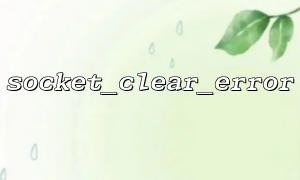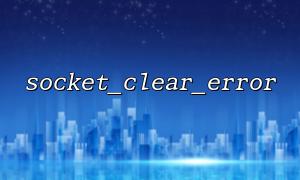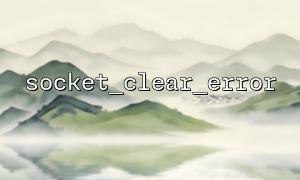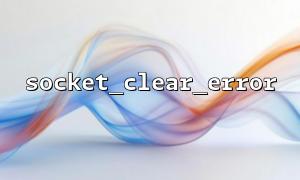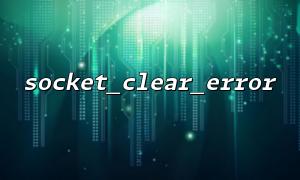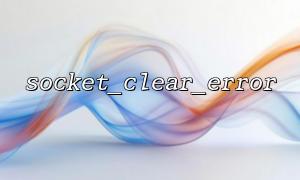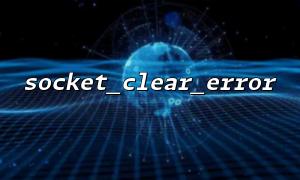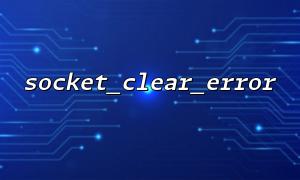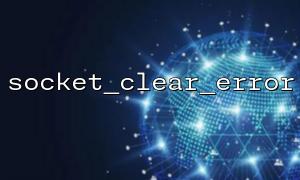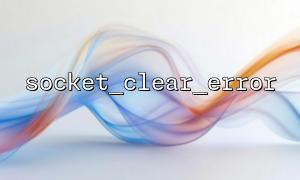When using PHP to build network communication-related programs, socket extension provides developers with powerful functions. It is especially important to understand the mechanism of error handling when learning how to build a basic server example using socket_create() , socket_bind() , socket_listen() and socket_accept() . This article will focus on how the socket_clear_error() function should be used correctly in the tutorial to avoid misjudgment errors and logical confusion.
The function of the socket_clear_error() function is to clear the previous socket error . This function can pass in an optional parameter $socket , if passed in, clear the error of the socket; if not passed in, clear the global last socket error (usually an error caused by the most recent failed socket operation).
socket_clear_error(resource $socket = null): void
It does not return a value, nor does it throw an error on failure. This means you should use it with caution and be clear about the scope and context of the error it clears.
Let's build a most basic Socket server and demonstrate the use of socket_clear_error() .
<?php
$host = '0.0.0.0';
$port = 8888;
// create socket
$socket = socket_create(AF_INET, SOCK_STREAM, SOL_TCP);
if ($socket === false) {
die("Socket create失败: " . socket_strerror(socket_last_error()) . "\n");
}
// Clear any residual errors,Make sure we start to be clean
socket_clear_error($socket);
// Bind socket Go to the address
if (!socket_bind($socket, $host, $port)) {
die("Socket Bind失败: " . socket_strerror(socket_last_error($socket)) . "\n");
}
// Start listening to the connection
if (!socket_listen($socket)) {
die("Socket Listening failed: " . socket_strerror(socket_last_error($socket)) . "\n");
}
echo "The server is started,Listen to port {$port}...\n";
do {
$client = @socket_accept($socket);
if ($client === false) {
$error = socket_last_error($socket);
if ($error !== SOCKET_EAGAIN && $error !== SOCKET_EWOULDBLOCK) {
echo "Failed to accept connection: " . socket_strerror($error) . "\n";
}
socket_clear_error($socket); // Clear error,Avoid interfering with the next cycle
continue;
}
$msg = "Welcome to m66.net Test server!\n";
socket_write($client, $msg, strlen($msg));
socket_close($client);
} while (true);
socket_close($socket);
Use in loop structures : When you handle socket_accept() , socket_read() and other operations in a while or do-while structure that continuously listens to the connection, if a call fails, socket_clear_error() should be called immediately after processing the error message to ensure that the next call will not falsely report the previous error.
Avoid misjudgment error status : PHP's socket_last_error() may continue to return the last error before subsequent successful calls. If you do not clear it, old error messages may be output repeatedly in the log or error handling logic.
Use with socket_strerror() : Although socket_last_error() returns an error code, it can only obtain meaningful information with socket_strerror() , which is especially important when debugging or log output.
Don't abuse clearance : Remember, don't call socket_clear_error() before the real error is not processed. It is not a shortcut to "eliminate errors", but a tool to clear the state after you know that the error has been processed.
When building socket tutorials, although socket_clear_error() is a simple function, its role in the error handling mechanism is very critical. Using it rationally can make your socket service more robust and avoid error contamination and logical misjudgment. Remember: clear the error when it is time to clear it, and do not call it blindly when it is not supposed to clear it.
